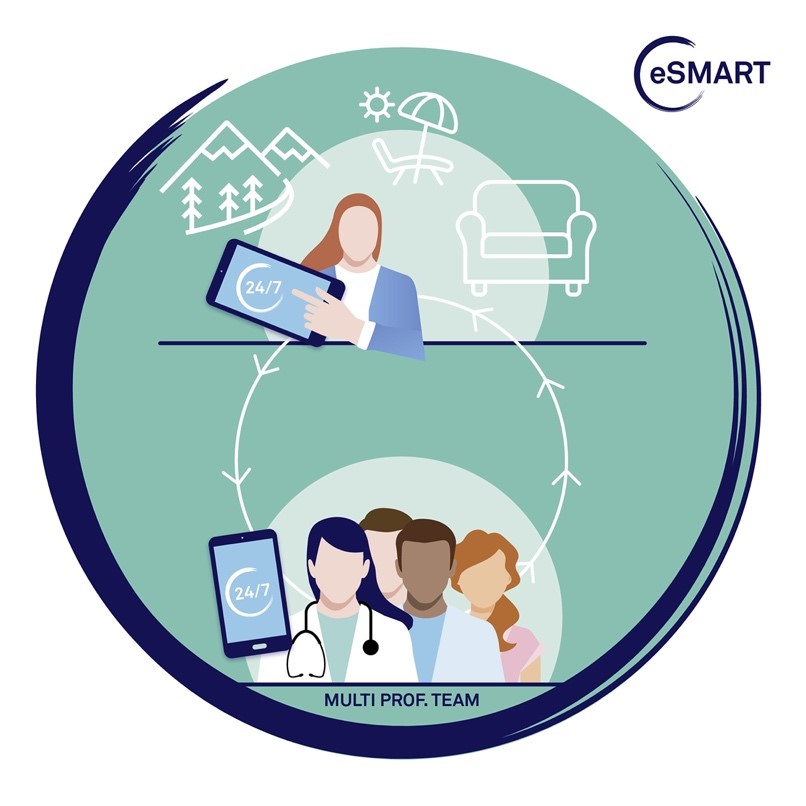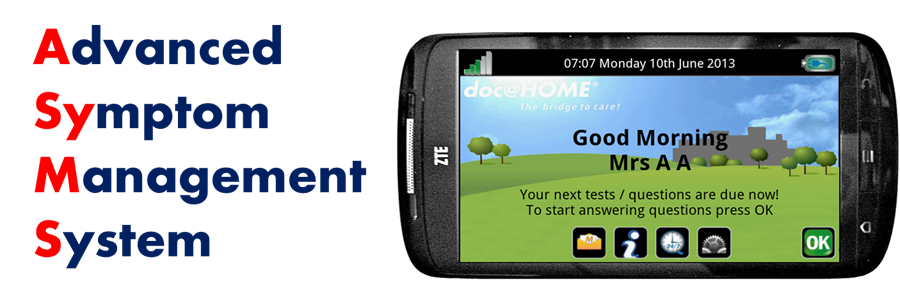Doc@Home® - telemedical support from home
Chemotherapy is a common form of treatment for cancer. It can cause various side effects and symptoms (complaints) which, if not treated appropriately, can be very distressing for the person affected. Chemotherapy is often given on an outpatient basis, so most patients have to deal with the side effects of treatment at home, with limited supervision from doctors and other healthcare professionals. It is therefore important to find out how people receiving chemotherapy can be supported in dealing with symptoms when they are at home or out of hospital.

In the period 2014-2019, the randomized controlled EU grant study eSMART was conducted at twelve hospitals in five European countries. MedUni Vienna was the only German-speaking site and was involved with a total of 140 patients suffering from cancer: Breast and colon cancer as well as Hodgkin's and non-Hodgkin's disease. Both study groups received the proven standard of care. The intervention group also received a smartphone-like device to take home. Two functions are linked to the smartphone: daily symptom recording and evidence-based information and education about the disease and possible side effects.
Almost two decades of development have now gone into the development and research of the Docobo® symptom management software. This technology enables real-time monitoring and symptom tracking of affected cancer patients. Daily symptom recording via an app on the patient's own smartphone not only makes the patient's everyday life easier, but also the clinical everyday life of the care team through direct, concrete, prompt assistance.
The aim of this implementation is possible early detection and reduction of chemotherapy-related side effects as well as possible improvements in the areas of quality of life, anxiety, depression, need for support, restrictions in professional activity, ability to care for oneself.
After each chemotherapy cycle (up to a maximum of six cycles) and three, six, nine and twelve months after completion of the sixth chemotherapy cycle, patient reported outcome measures (PROMs) were collected by both study groups:
- Functional Assessment of Cancer Therapy-General (FACT-G)
- Supportive Care Needs Survey-Short Form 34 (SCNS-SF34)
- State-Trait Anxiety Inventory-Revised (STAI-Y)
- Communication and Attitudinal Self-Efficacy scale for cancer (CASE-Cancer)
- Work Limitations Questionnaire (WLQ)
- EuroQol (EQ-5D)
- Client Services Receipt Inventory (CSRI)
Overall, 829 study participants within the EU showed that there was a significant improvement in the intervention group (telemedicine arm) compared to the previous standard of care (control group). In terms of health-related quality of life (FACT-G), support needs (SCNSSF34), state-trait anxiety (STAI-Y), self-efficacy (CASE-Cancer) and work limitations (WLQ), the symptom burden in the intervention group remained at the pre-chemotherapy level, while the control group (standard treatment) reported an increase from cycle 1. Supportive care needs were lower for most SCNS-SF34 domains in the intervention group, including sexuality needs, care and support needs, and physical and daily living needs. (Maguire et al., 2021)
The Docoboapp can now be downloaded to your smartphone from the App Store (Apple devices) and Google Play (Android devices). After registering the patient on the online platform, a ten-digit personal code is created, which is required to link the app to the stored profile. The CE (class I and IIA) certified medical device is thus used in compliance with data protection regulations. This creates personalized access to symptom management: Information specifically tailored to the patient's disease and medication can be provided and evidence-based questionnaires (PROMs) can be used to inquire about the patient's current state of health. In the future, it will also be possible to contact patients via video call using the online platform or to program reminder functions to help them take their medication correctly.
Referenzen:
Maguire, R. et al. (2021) ‘Real time remote symptom monitoring during chemotherapy for cancer: European multicentre randomised controlled trial (eSMART)’, BMJ, p. n1647. doi: 10.1136/BMJ.N1647.
Short Cuts:
- DSGVO konformes Fernüberwachungssystem in Echtzeit
- Tägliches Symptom tracking und Symptom Management
- CE (class I and IIA) zertifiziertes Medizinprodukt
- Elektronischer Patientenakt via ELGA in KIS integrierbar
- Patient-reported outcome measures (PROMs) zur Erfassung von Lebensqualität und gesundheitsbezogenen Aspekten

